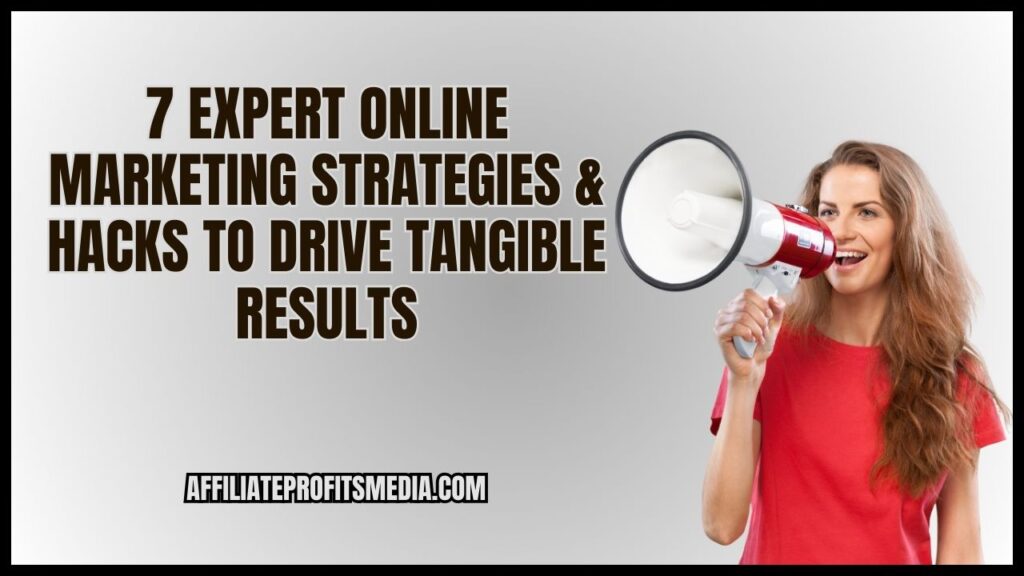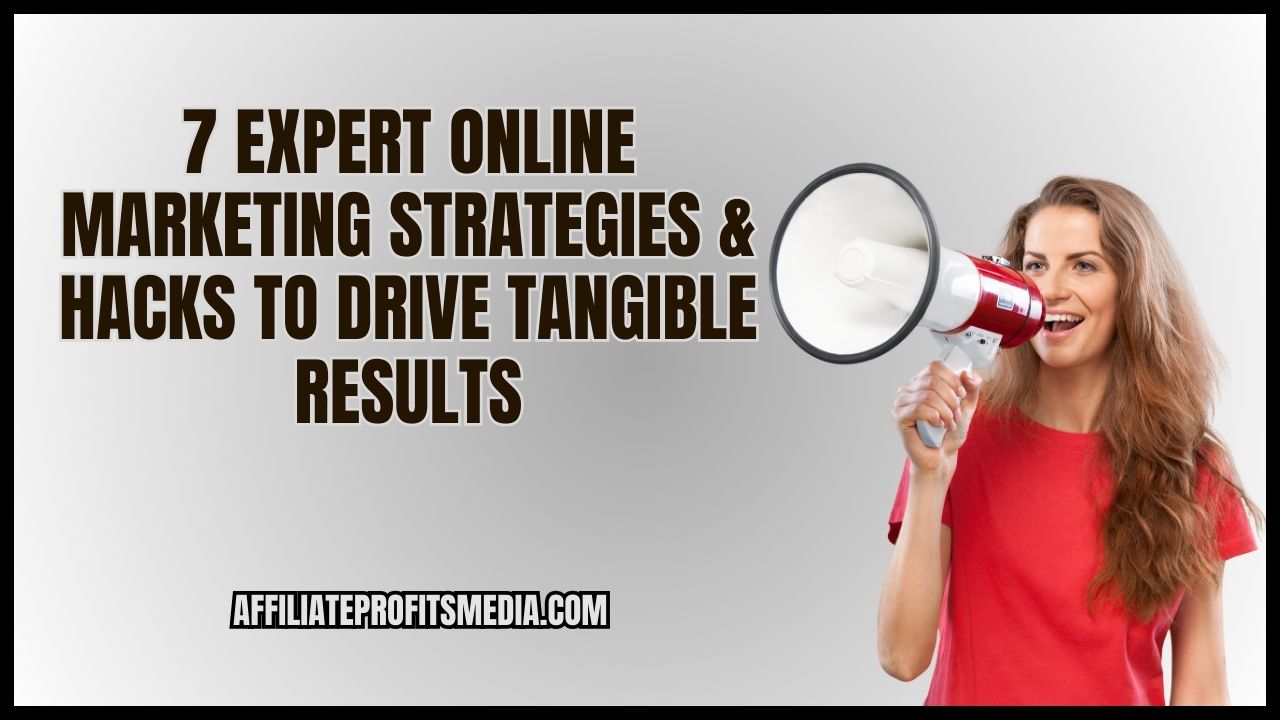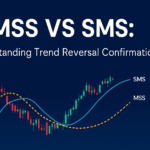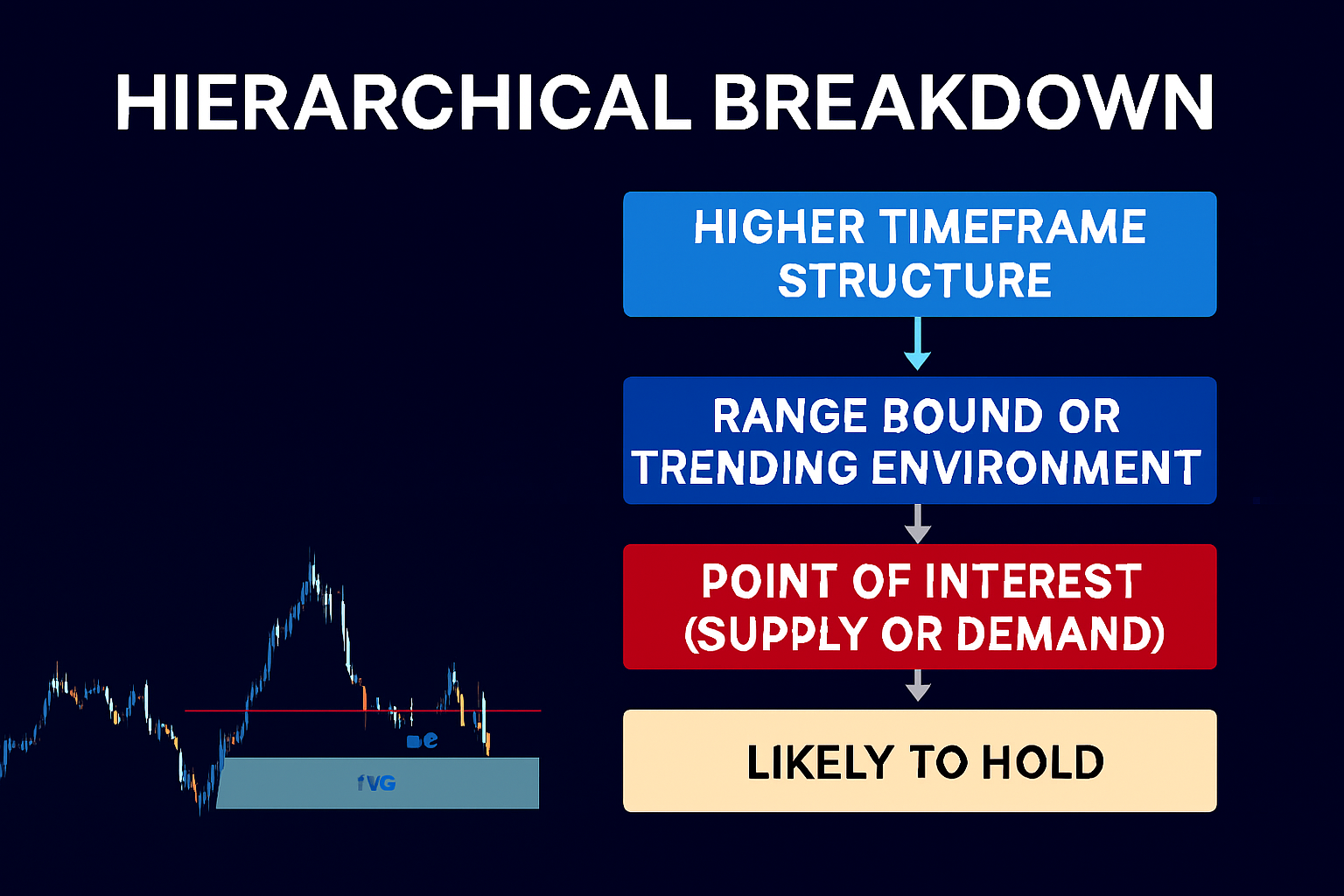In today’s competitive digital landscape, having a solid online marketing strategy is essential for businesses to stand out and drive tangible results. From increasing brand visibility to boosting sales, effective online marketing can make a significant impact on your bottom line. To help you navigate this complex terrain, we’ve compiled seven expert strategies and hacks that will elevate your online marketing efforts and deliver measurable results.
>> Here’s the Proven Way to Make $100-$200 Daily with 0 Investment – Watch This FREE Video and Start Now >>

1.Optimize Your Website for Search Engines (SEO)
Search Engine Optimization (SEO) is the cornerstone of any successful online marketing strategy. By optimizing your website for relevant keywords, improving site speed, and enhancing user experience, you can increase your chances of ranking higher in search engine results pages (SERPs). This not only drives organic traffic to your site but also establishes credibility and trust with your audience.
2. Create High-Quality Content (Online Marketing)
Content is king in the digital world. Producing high-quality, relevant content not only attracts and engages your target audience but also helps improve your search engine rankings. Whether it’s blog posts, videos, infographics, or podcasts, focus on creating content that provides value to your audience and solves their problems.
3. Leverage the Power of Social Media
Social media platforms offer unparalleled opportunities for businesses to connect with their audience on a more personal level. Develop a strong presence on platforms like Facebook, Instagram, Twitter, and LinkedIn, and engage with your followers regularly. Utilize paid advertising, influencer partnerships, and user-generated content to expand your reach and drive traffic to your website.
4. Implement Email Marketing Campaigns
Email marketing remains one of the most effective ways to nurture leads and drive conversions. Segment your email list based on demographics, interests, and behaviors to deliver targeted messages that resonate with your subscribers. Experiment with personalized subject lines, compelling CTAs, and automated workflows to maximize engagement and drive tangible results.
5. Invest in Paid Advertising (Online Marketing)
While organic traffic is valuable, paid advertising can provide an instant boost to your online visibility and lead generation efforts. Platforms like Google Ads, Facebook Ads, and LinkedIn Ads allow you to target specific demographics, interests, and behaviors with precision. Experiment with different ad formats, targeting options, and bidding strategies to optimize your campaigns for maximum ROI.
6. Optimize Your Conversion Funnel (Online Marketing)
A well-optimized conversion funnel is crucial for turning website visitors into paying customers. Analyze your funnel at every stage, from awareness to conversion, and identify areas for improvement. Whether it’s streamlining your checkout process, offering incentives, or implementing retargeting campaigns, focus on removing friction points and guiding users towards conversion.
7. Monitor and Analyze Your Results
Data-driven decision-making is key to refining and improving your online marketing strategies over time. Use tools like Google Analytics, Facebook Insights, and CRM systems to track key metrics such as website traffic, conversion rates, and customer acquisition costs. Continuously analyze your results, identify patterns and trends, and adjust your strategies accordingly to drive ongoing success.
>> Here’s the Proven Way to Make $100-$200 Daily with 0 Investment – Watch This FREE Video and Start Now >>
Optimize Your Website for Search Engines (SEO)
In the digital age, having a website isn’t enough; it needs to be easily discoverable by search engines. Search Engine Optimization (SEO) is the key to improving your website’s visibility and driving organic traffic. Here are eight essential points to optimize your website for search engines effectively:
- Keyword Research: Identify relevant keywords for your business and incorporate them naturally into your website content.
- On-Page Optimization: Optimize titles, meta descriptions, headers, and URLs to make them search engine-friendly.
- Quality Content: Create valuable, engaging content that satisfies user intent and provides solutions to their queries.
- Mobile-Friendliness: Ensure your website is responsive and optimized for mobile devices to improve user experience and rankings.
- Page Speed Optimization: Improve loading times to enhance user experience and avoid losing visitors due to slow loading pages.
- Internal Linking: Link relevant pages within your website to improve navigation and distribute link equity.
- Schema Markup: Implement structured data markup to help search engines understand your content better and display rich snippets in search results.
- Regular Updates: Keep your website fresh with new content and updates to signal to search engines that it’s active and relevant.
Optimizing your website for search engines is crucial for attracting organic traffic and improving your online presence. By following these eight essential points, you can enhance your site’s visibility, drive more traffic, and ultimately, achieve your business goals.
Create High-Quality Content (Online Marketing)
In the realm of online marketing, content is king. High-quality content not only attracts your target audience but also keeps them engaged and builds trust in your brand. Here are seven key points to ensure you’re producing top-notch content:
- Understand Your Audience: Research your audience’s interests, pain points, and preferences to create content that resonates with them.
- Provide Value: Offer valuable and relevant information that solves problems or fulfills needs for your audience.
- Maintain Consistency: Stick to a consistent posting schedule to keep your audience engaged and build anticipation.
- Use Visuals: Incorporate images, videos, infographics, and other visuals to enhance the readability and shareability of your content.
- Optimize for SEO: Include relevant keywords, headers, and meta descriptions to improve your content’s visibility in search engine results.
- Encourage Engagement: Prompt your audience to comment, share, and interact with your content to foster a sense of community.
- Measure and Analyze: Track metrics such as engagement, traffic, and conversions to understand what content resonates best with your audience.
Creating high-quality content is essential for driving engagement, building brand authority, and ultimately, achieving your marketing objectives. By focusing on understanding your audience, providing value, and optimizing for search engines, you can produce content that stands out and delivers results.
Leverage the Power of Social Media
Social media has revolutionized the way businesses connect with their audience. Leveraging its power effectively can amplify your brand’s reach and engagement. Here are six key points to maximize your social media presence:
- Choose the Right Platforms: Identify the social media platforms where your target audience is most active to focus your efforts effectively.
- Create Compelling Content: Produce engaging content that resonates with your audience’s interests, including images, videos, and interactive posts.
- Consistent Branding: Maintain a consistent brand voice, tone, and visual identity across all your social media profiles for better recognition.
- Engage with Your Audience: Respond promptly to comments, messages, and mentions to foster relationships and build trust with your followers.
- Utilize Paid Advertising: Invest in targeted advertising to expand your reach and drive traffic to your website or landing pages.
- Monitor and Analyze Performance: Track key metrics such as engagement, reach, and conversions to refine your social media strategy over time.
By leveraging social media effectively, businesses can strengthen their online presence, engage with their audience, and drive meaningful results. Consistent, engaging content, combined with strategic use of paid advertising and analytics, can help businesses thrive in the competitive digital landscape.
Implement Email Marketing Campaigns
Email marketing remains one of the most powerful tools in a marketer’s arsenal, offering direct access to your audience’s inbox. Here are seven key points to help you craft effective email marketing campaigns:
- Build a Quality Email List: Gather email addresses through opt-ins, subscriptions, and lead magnets to ensure you’re reaching interested recipients.
- Segment Your Audience: Divide your email list based on demographics, interests, and behaviors to send targeted, personalized messages.
- Create Compelling Content: Craft engaging subject lines and valuable content that drives opens, clicks, and conversions.
- Design Responsive Templates: Ensure your emails are mobile-friendly and visually appealing across different devices and email clients.
- Automate Workflows: Set up automated email sequences for welcome emails, abandoned cart reminders, and follow-ups to nurture leads and improve conversion rates.
- A/B Test Campaigns: Experiment with different elements such as subject lines, CTAs, and send times to optimize your campaigns for maximum effectiveness.
- Monitor and Analyze Results: Track metrics like open rates, click-through rates, and conversions to evaluate the performance of your campaigns and make data-driven improvements.
By implementing these strategies, businesses can leverage the power of email marketing to nurture leads, drive sales, and build lasting relationships with their audience. Consistent optimization and analysis are key to maximizing the effectiveness of your email campaigns over time.
>> Here’s the Proven Way to Make $100-$200 Daily with 0 Investment – Watch This FREE Video and Start Now >>
Invest in Paid Advertising (Online Marketing)
Paid advertising offers businesses a powerful way to reach their target audience and drive immediate results. Here are seven key points to help you make the most of your investment in paid advertising:
- Set Clear Goals: Define specific objectives such as increasing sales, generating leads, or boosting brand awareness to guide your advertising strategy.
- Know Your Audience: Use audience targeting options to reach the right people based on demographics, interests, and behaviors.
- Choose the Right Platforms: Select advertising platforms such as Google Ads, Facebook Ads, or LinkedIn Ads that align with your audience and goals.
- Create Compelling Ad Creative: Craft attention-grabbing ad copy and visuals that entice users to click and take action.
- Optimize for Conversions: Continuously optimize your campaigns for conversions by testing different ad formats, targeting options, and bidding strategies.
- Monitor Performance: Regularly review key metrics like click-through rates, conversion rates, and return on ad spend (ROAS) to evaluate performance and make data-driven adjustments.
- Budget Wisely: Allocate your advertising budget strategically, focusing on channels and campaigns that deliver the best results for your business goals.
Paid advertising can be a highly effective way to achieve your marketing objectives quickly and efficiently. By following these strategies and continuously optimizing your campaigns, you can maximize the return on your advertising investment and drive tangible results for your business.
Optimize Your Conversion Funnel (Online Marketing)
A well-optimized conversion funnel is essential for turning website visitors into paying customers. Here are eight key points to help you streamline and improve your conversion funnel:
- Understand Your Audience: Identify your target audience’s needs, pain points, and preferences to tailor your funnel accordingly.
- Map Out the Funnel: Define each stage of the conversion funnel, from awareness to purchase, and identify potential barriers or drop-off points.
- Streamline the User Experience: Simplify navigation, minimize form fields, and remove any unnecessary steps to make the conversion process as smooth as possible.
- Offer Incentives: Provide incentives such as discounts, free trials, or exclusive offers to encourage users to move through the funnel.
- Optimize Landing Pages: Ensure your landing pages are optimized for conversions with compelling headlines, clear CTAs, and persuasive copy.
- Implement Retargeting: Use retargeting campaigns to re-engage users who have shown interest but haven’t converted, keeping your brand top-of-mind.
- Provide Social Proof: Display customer testimonials, reviews, and case studies to build trust and credibility with potential customers.
- Track and Analyze Performance: Monitor key metrics such as conversion rates, bounce rates, and average order value to identify areas for improvement and optimize your funnel over time.
By optimizing your conversion funnel with these strategies, you can increase conversions, improve customer satisfaction, and drive growth for your business. Continuously analyze performance and make adjustments to ensure your funnel is effectively guiding users towards conversion.
Monitor and Analyze Your Results
Monitoring and analyzing your marketing results is crucial for understanding what’s working and what’s not. Here are six key points to help you effectively track and analyze your performance:
- Define Key Metrics: Determine the metrics that align with your goals, such as website traffic, conversion rates, and return on investment (ROI).
- Use Analytics Tools: Utilize tools like Google Analytics, social media insights, and email marketing platforms to gather data on your marketing efforts.
- Regular Reporting: Set up regular reporting schedules to track progress over time and identify trends or patterns.
- Segment Data: Break down your data by demographics, channels, and campaigns to gain deeper insights into your audience and performance.
- Identify Successes and Failures: Determine which strategies are driving results and which ones need adjustment or abandonment.
- Iterate and Improve: Use your analysis to refine your marketing strategies, experiment with new approaches, and continuously improve your results.
Monitoring and analyzing your results is essential for optimizing your marketing efforts and maximizing your return on investment. By staying vigilant, tracking key metrics, and making data-driven decisions, you can ensure that your marketing strategies are effective and aligned with your business objectives.
Conclusion (Online Marketing)
By implementing these expert online marketing strategies and hacks, you can drive tangible results for your business and stay ahead of the competition in today’s digital landscape. Remember to stay agile, test different tactics, and always prioritize providing value to your audience. With persistence and strategic execution, you’ll see your online presence flourish and your bottom line grow.
>> Here’s the Proven Way to Make $100-$200 Daily with 0 Investment – Watch This FREE Video and Start Now >>
Thank you for taking the time to read my article “7 Expert Online Marketing Strategies & Hacks to Drive Tangible Results”, hope it helps!













